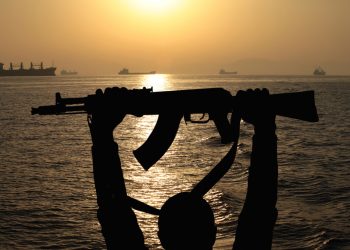More than 250 seafarers remain in pirate hands
 It is very easy for governments to suggest that nobody should ever contemplate the payment of ransoms to hostage takers of any kind, with pirates clearly falling into this category. They say that it plays into the pirates’ hands and on the ancient principle of “Danegeld” – the money used by British kings 1,000 years ago to dissuade the Viking raiders from their attacks – they will just come back for more.
It is very easy for governments to suggest that nobody should ever contemplate the payment of ransoms to hostage takers of any kind, with pirates clearly falling into this category. They say that it plays into the pirates’ hands and on the ancient principle of “Danegeld” – the money used by British kings 1,000 years ago to dissuade the Viking raiders from their attacks – they will just come back for more.
In principle, such an attitude might be understandable, but statements of theoretical policy are always easier than practical action when the hostage-takers strike. And while governments might disapprove, it can reasonably be argued that those whose employees or indeed loved ones have been captured by ruthless pirates have an inescapable moral duty to take every course they can to get them back. In the case of seafarers, their employers are also responsible in law for their welfare and it would be reprehensible in every sense of the word if some sort of legal prohibitions prevented them for paying ransoms to the pirates.
It might be repugnant to see these violent criminals and those directing them happily collecting these payments, but there is no practical alternative if we wish to see shipping continue to transit these pirate-infested waters. Last month, BIMCO Secretary-General Torben Skaanild spelt out the reality of the situation, suggesting that as long as governments were unprepared to deal with the internal situation in this failed state, ship owners were forced to do what they could to prevent successful attacks and if ships were taken, to pay ransoms to recover them and their crews.
So it is dispiriting to see politicians continuing to nag away at this issue of ransom payment in a sort of corrosive undermining of the practical reality in which BIMCO and its industry partners must operate. If there was a political will to tackle the problem of piracy, which could well spread to other parts of the world from the Indian Ocean, Gulf of Aden and West Africa, it would be more encouraging. And while the industry is thankful that a reasonable number of nations continue to station warships to tackle Somali piracy, if there was any real signs of a determination to tackle the root causes ashore it would be seen as a step in the right direction.
Last week alone, the pirates “got lucky” again, capturing one sizeable merchant ship and three fishing craft. There remain more than 250 seafarers in pirate hands, some of whom have been in captivity for a very long time. The problem is not going away and while there may have been encouraging signs of progress as regards prosecutions and prisons for pirates in the vicinity, and an enthusiastic reception for BIMCO’s GUARDCON contract for guards on merchant ships (another piece of practical assistance for industry), we are left with the root causes of piracy presently untouched and the nagging political voices from those who deplore ransom payments on principle.
There are other principles: that we cannot leave innocent merchant mariners to their fate, and that some of the busiest world trade routes can scarcely be permitted to dry up, because of the very genuine fears of seafarers, that, if captured, they would be simply be permitted to rot in captivity.
Source: BIMCO, Watchkeeper





























































